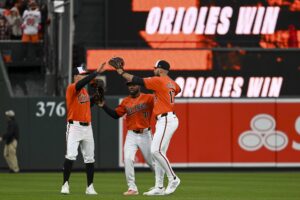It all began with Dansby Swanson. Maybe it was hyperbole or maybe they honestly believed it, but Braves broadcasters insisted he was an All-Star. While his bat was on the rise, his defense had taken a step (or several) backward. Ergo, despite the offensive improvements, his value had not changed. But in an era of record-setting home run totals, strikeouts and walks, is defense still relevant?
Does Defense Still Matter?
The raw data is a mess. Statisticians agree that defensive metrics are imperfect, and that defensive numbers can vary wildly from year to year.
The Numbers
While the question began with Dansby Swanson, it solidified here. Take the Los Angeles Angels. Defensive Runs Saved (DRS) has them 20th, with negative nine runs saved as a team. Fangraphs metrics have the team seventh, with an aggregate score of 16.4. How can two metrics look at the same team for three and a half months and come to such drastically different conclusions?
They agree only at the very bottom. Both metrics say the New York Mets are a horrible defensive team. DRS has them 29th. Fangraphs has them last. As the Mets are floundering, it would be all too easy to look and say that the team is bad because of the defense, ergo defense matters. The problem with that scenario is the other 29 teams.
Both metrics also agree that the Seattle Mariners and Baltimore Orioles are awful and the Arizona Diamondbacks are very good. But then the metrics diverge rapidly. DRS says the Atlanta Braves are the 13th-best defense in baseball while Fangraphs says they are the 24th-worst. DRS says the Los Angeles Dodgers are the best defense in baseball. Fangraphs has them ninth. The Oakland A’s are sixth-best in Fangraphs estimation, 14th in DRS. Fangraphs thinks the Philadelphia Phillies defense is excellent, ranking them third overall. DRS says their defense is mediocre, ranking them 16th.
While not exact matches, DRS correlates strongly with Out Of Zone scores. The more plays a team makes outside of the typical, the higher their DRS seems to be. Fangraphs rankings correlate strongly with Ultimate Zone Rating. There are clearly multiple different systems at work, all evaluating the same plays differently.
Cue Cards and the Shift
Players now have defensive positioning cards that they carry around that tell them where to lineup for every hitter. Defenses have been shifting for years, including the occasional four outfielders or five infielders shift. Basically, teams are using data and batted ball trends to try and position players precisely where they think a ball will be hit. If the ball is not hit there, and the play is not made, is that really a defensive mistake?
During the All-Star game, several players wore microphones on the field. When asked, they all acknowledged that they had to pay attention to the signs and attempt to know what was coming, as that affects how they play defense. However, again, if a pitcher misses his spot or crosses up his catcher, the fielder might not be in a position to react well. Is that a defensive mistake?
What is happening across the league is a trend to try and minimize defensive reactions (or lack thereof). While they will always be a part of the game, initial positioning matters more and more. It is entirely possible that one set of metrics is telling us how well a player initially positions himself, and another is telling us how well he reacts when out of position.
The problem is figuring out how to correctly merge the two. Maybe the Braves are bad at initially positioning but can generally recover. Maybe the Angels excel at positioning but have terrible reaction times when something unexpected happens. There’s currently no way to truly tell.
What Defense Means
The eye test is still a thing when it comes to defense. Eyes can tell you when a player is letting the ball hit the heel of his glove more often, slowing his transition to throwing. Eyes can tell you when a player is using speed to try to recover from a poor initial read in the outfield. What eyes can’t do is tell us how good a third baseman is at making a third base play while playing shortstop in the shift or how good a center fielder is at covering for a statue in one of the corners. Every time someone does it, it seems spectacular to the viewer, but that does not necessarily mean it is.
More than anything else, what defensive metrics are trying to determine is what should be viewed as ordinary. Which plays should always be made regardless of who the defender is. The metrics are not there yet. However, all the metrics agree that after being one of the five or six best defensive shortstops last season, Dansby Swanson has been decidedly below average so far in 2019. With a wRC+ lower than the likes of Kevin Newman and J.P. Crawford, Swanson was never likely to be an All-Star regardless of his defense, though the decline did not help.
Freddie Freeman and Charlie Blackmon were All-Stars this year. Fangraphs’ metric says they are the two worst-qualified defenders in baseball. DRS actually thinks Freeman is fine, though it agrees that Blackmon struggles. All of this leads to the original question: does defense still matter? When there seems to be no agreement between metrics, no correlation between superlative defense and a superlative record, no correlation between defense and All-Star votes . . . yes, defense still matters. Not as much as it used to. Not as much as WAR thinks it does. But enough that it is still a bad idea to put Brian McCann in center field or at shortstop.
Main Photo
Embed from Getty Images






